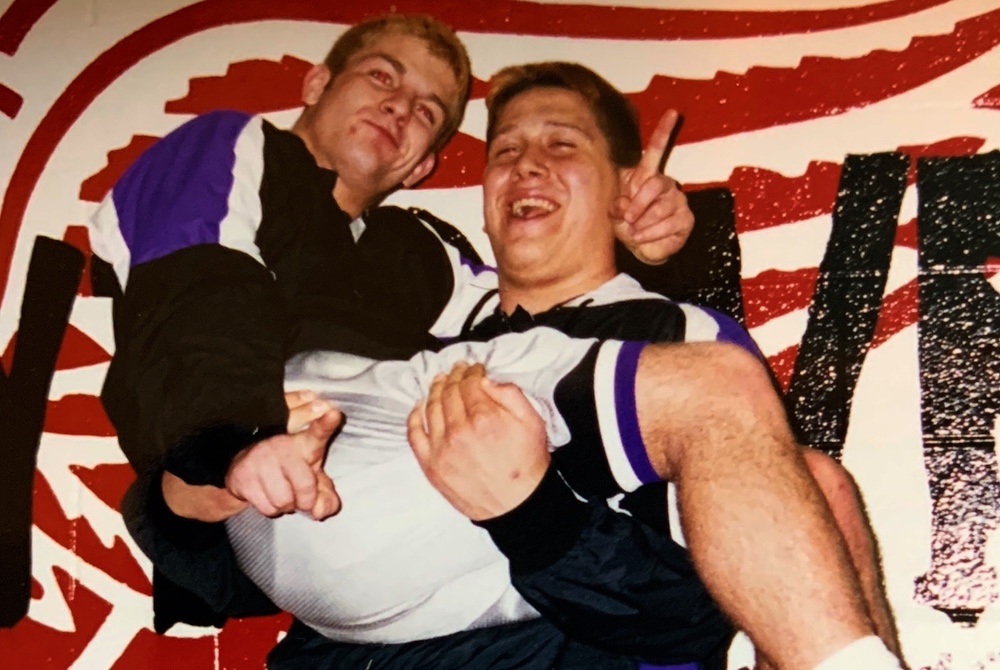
Caro Champs Find Common Ground Again as Mental Health Providers
By
Paul Costanzo
Special for MHSAA.com
July 8, 2021
Phil Millerov and Phil Niklowicz wanted to do more than simply defeat opponents when wrestling at Caro High School.
They wanted to dominate – physically and mentally.
 “We had this thing between us where we wanted to be done, and (opponents) didn’t want to come back on the mat with us,” Millerov said.
“We had this thing between us where we wanted to be done, and (opponents) didn’t want to come back on the mat with us,” Millerov said.
Twenty years later, both spend their days building people up. Millerov is a licensed professional counselor, while Niklowicz is a licensed therapist.
“I went out there looking to dominate and make sure it was known that I am the superior wrestler in all facets,” Niklowicz said. “I would try to run up as many points as fast as I can. I would teach the same thing when coaching, specifically with my nephew. You’re saying, ‘Listen, we want to break these people.’ Then the next day, in a therapy session, it’s like, ‘Let’s build up your self-esteem and set some goals to boost ourselves up.’”
The close friends and two faces of Caro’s surging wrestling program in the late 1990s now have very similar careers. Millerov – who finished second, third and first at 275 pounds in the 1998, 1999 and 2000 MHSAA Finals, respectively -- works in private practice at Transitions Counseling Service in Greenville, where he specializes in substance abuse disorders. He also has served as a Class 1 Fellow at the WK Kellogg Foundation.
Niklowicz – a two-time MHSAA Finals champion (1999 and 2000) and four-time placer – is working in private practice in Southfield, seeing mostly children. He also works in adult foster care with patients who have had traumatic brain injuries.
“He and I went and hiked Pictured Rocks at the beginning of May,” Millerov said. “And we joked about how nobody would have guessed that we’d be doing this now.”
That Millerov and Niklowicz are still close does not come as a surprise. Their friendship began when their wrestling careers did, as 6-year-olds in the Caro Growlers program. As they were becoming two of the state’s top wrestlers, they would share rides to tournaments, and their families grew close.
In high school, despite their size difference – Niklowicz wrestled at 135 his senior year – it wasn’t uncommon to see them warming up together.
“We were definitely easy going and liked to mess around a lot,” Niklowicz said. “We used to mess around before meets and throw each other. He would jump and I would throw him. People would look at us like, ‘Why is that little guy throwing that big guy?’”
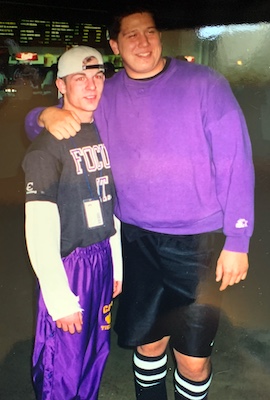 While their teams never made it out of the Regional, Millerov and Niklowicz helped set the stage for a program that would become among the best in Division 3 throughout the 2000s, qualifying for five straight Quarterfinals from 2003-07 and winning the Division 3 Finals title in 2003.
While their teams never made it out of the Regional, Millerov and Niklowicz helped set the stage for a program that would become among the best in Division 3 throughout the 2000s, qualifying for five straight Quarterfinals from 2003-07 and winning the Division 3 Finals title in 2003.
Individually, they were among the most well-known and feared wrestlers in the state.
“Niklowicz and I were fortunate to have each other, because we pushed each other,” Millerov said. “We were in constant competition with each other and ourselves. Just to kind of push each other, it was a great thing.”
Niklowicz finished fifth as a freshman and third as a sophomore before winning back-to-back titles to close out his career. In 1999, he defeated Nick Oertel of Goodrich 9-2 in the 125-pound final, and the next year he defeated Oertel’s teammate, Ryan Tripp, 7-5 at 135. Tripp would go on to win an individual title the following year. Niklowicz would finish his career with 214 victories.
“I think probably both (Finals titles) were equal,” Niklowicz said. “I think there was probably a little more stress going into my senior year. My motivation always came from improving, then it was maintaining the state title. You don’t want to go the opposite direction.”
Millerov lost a tight 6-4 decision against Remus Chippewa Hills’ Bob Kozlowski in the MHSAA Finals as a sophomore, and had an epic 12-10 match against future NFL defensive lineman Jason Babin of Paw Paw in the 1999 semifinals before fighting back to take third. The next year, he won his title via first-period pin against Dan Kliphuis, a two-time runner-up from Grand Rapids West Catholic. Millerov finished with 196 career wins and set the state record for pins in a career (160), which was broken the next season by Nick Simmons of Williamston and is now held by Justin Zeerip of Hesperia. The 56 pins Millerov recorded his senior season remains second all-time to Simmons, who had two seasons with 57.
“I never really thought about (the pin record) to be quite honest,” Millerov said. “It was just kind of in the background. It didn’t matter; all I cared about was winning this match, and I wanted to do it in the most effective, efficient way I could.”
They both continued their wrestling careers, but went their separate ways in college, with Millerov heading to Neosho County Community College in Kansas and Niklowicz to Virginia Tech.
Millerov had interest from several Division I schools coming out of high school, including some in the Big Ten, but he admits his grades weren’t good enough at the time. Neosho provided a chance to compete with some of the best in the country while at the junior college level, however, as the team took second at the National Junior College Athletic Association championships in 2002.
He transferred to Central Michigan after his sophomore year, joining his girlfriend – now his wife – who was already attending, and walking onto the wrestling team. While his relationship lasted, wrestling did not.
“I was distracted,” Millerov said. “My grandmother passed away in 2002 in that summer. I was trying to get that motivation back, and I just lost it. There has to be that edge with wrestling. When things didn’t work out, I struggled. Wrestling was my identity.”
Millerov was working to follow in his father’s footsteps and become a police officer. But the elder Phil Millerov, who died in 2012, talked his son out of it.
“Looking back on it, for me, it was obviously the right decision,” Millerov said.
The idea to go into counseling came after Millerov was married in 2006, as his wife had gotten into the program. He went back to school to earn his bachelor’s degree from CMU in 2007, and would go on to get his master’s from CMU, as well.
“I had taken a bunch of psychology courses just because I liked the field,” Millerov said. “I liked to be challenged. I liked puzzles, and with psychology, it’s like a new puzzle every hour. It just clicked. I flew through and graduated with like a 3.8. I was like, ‘Wow, I kind of feel smart.’ It was good to find something I was passionate about again.”
Millerov said he’s constantly learning and honing his craft, much like he did as a wrestler. A major difference now, however, is that he’s found more balance in his life.
“I think about working with athletes in addiction, I find a lot of similarities,” he said. “Wrestling was my life, it’s how I identified myself. I hear that same kind of talk around people struggling with addiction. One you’re considered successful for, the other you’re not. Most of my growth has been around finding balance. I find that my happiness and my clients’ as well, is when we found that balance instead of being good at just one thing. I want you to have passion, I want you to do things you love, but I also want you to be effective as a husband, a father, whatever other responsibilities you have.”
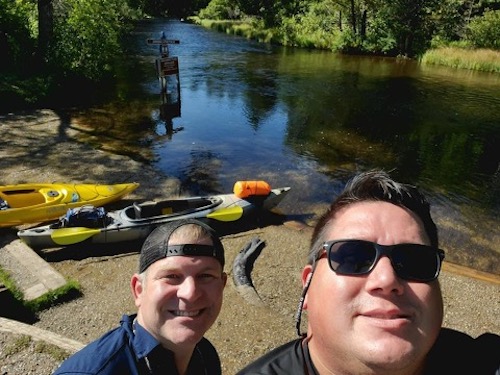 Niklowicz’s journey to becoming a therapist was more telegraphed, as both of his parents work in mental health, and he said it was always something he wanted to do, as well.
Niklowicz’s journey to becoming a therapist was more telegraphed, as both of his parents work in mental health, and he said it was always something he wanted to do, as well.
He attended Virginia Tech on a wrestling scholarship, but transferred to Eastern Michigan after one year. The Hokies had recruited him to wrestle at 133 pounds, but when the team’s 125-pounder was injured, Niklowicz was asked to cut down further. Like Millerov, he struggled when his wrestling career ended.
“I just had a really bad taste in my mouth after leaving Virginia Tech and trying to cut all this weight,” he said. “Some of it was I had lost the desire to work out, to wrestle. Fifteen years, roughly, of my life was dedicated to wrestling, and once you stop, what do I do with my winters? What do I do with seven months of the year? It was definitely a part of my identity; that’s why I got into coaching. I did MMA fighting for a little bit to have something competitive.”
Like Millerov, Niklowicz said finding balance was important.
“In the mental health field, specifically, there’s a lot of burnout for people,” he said. “Every day, you’re listening to people talking about their problems, but at the same time, they’re coming for a reason and they’re there for help, so you have to provide that help and have to motivate yourself to come to the office every day and give it your best. I try to instill the motivation that I used to other people.”
When Niklowicz looks at his time as an athlete compared to his work as a therapist, he said that work ethic is the main characteristic that has carried over.
“I think my practice mentality was the same as it was on the mat,” he said. “Even in the wrestling room, these are people I’m friends with, people I grew up with, and I still didn’t want anyone to score on me. Then you just look at your work ethic outside of wrestling, whether you’re studying for exams or motivating yourself to get up and go to class.”
While they are no longer living in the same town or living similar lives – Millerov is married with three kids, while Niklowicz is single – the connection between Caro’s dominant duo remains strong, both professionally and personally.
“I don’t think we ever thought we would be going down such a similar path, and I doubt that either one of us grew up thinking we would do the exact same thing,” Niklowicz said. “We met when we were 6 years old, and we’ve been best friends forever. I think it’s hilarious that we’ve taken such similar paths but with some glaring differences. It’s definitely interesting that we’re still really good friends after 30-some years, especially since we’ve moved on and gone our separate ways.”
2020-21 Made in Michigan
June 28: Michigan's Minor Leaguers Making Up for Lost Season - Read
PHOTOS: (Top) Caro’s Phil Millerov lifts teammate Phil Niklowicz as both celebrate Division 3 championships during the 2000 Individual Finals at Joe Louis Arena. (Middle) Niklowicz, left, and Millerov were high school warm-up partners despite wrestling at significantly different weights. (Below) Niklowicz and Millerov take a selfie during a hiking trip to Pictured Rocks National Lakeshore in May. (Photos courtesy of Niklowicz and Millerov.)
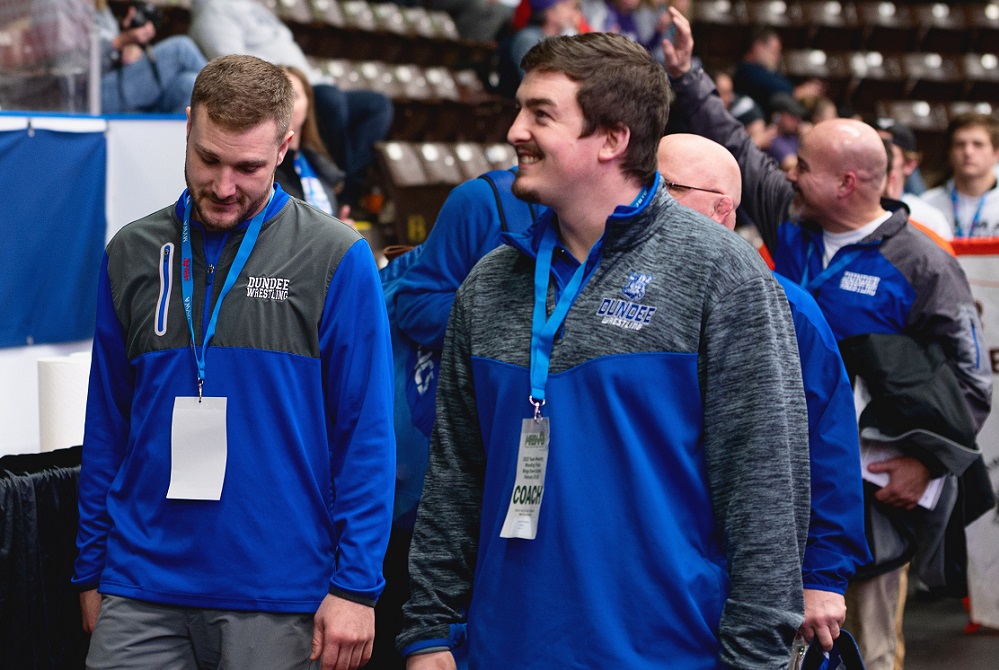
Hall, Stevens Teaming Up to Continue Dundee Championship Tradition
By
Doug Donnelly
Special for MHSAA.com
November 22, 2022
DUNDEE – How do you replace a legendary coach?
 For the Dundee Vikings wrestling program, it takes two.
For the Dundee Vikings wrestling program, it takes two.
Nate Hall and Garrett Stevens opened practice last week as the new co-coaches of the ultra-successful Dundee wrestling program, taking the reins from Tim Roberts, one of the winningest coaches in state wrestling history.
“From day one, we’ve done a really good job of pushing each other and staying focused,” Stevens said. “The kids have been getting after it. Things are going well.”
Dundee’s wrestling program is a rich one. Roberts stepped down with a state-record 10 MHSAA Finals titles over his 23 seasons as head coach. In all 23 of those years, Dundee won District championships, and in 22 of those 23 years the Vikings won Regional titles. Roberts not only accumulated 10 Finals championship trophies, but he also won more than 500 dual matches.
Hall and Stevens have coached together for several years on the Dundee staff. Now they are dividing up duties and looking to start the next era of Vikings wrestling.
“We know what we are up against,” Hall said. “We have a strong tradition to keep on. We understand two people going at it is probably the better route.”
The move is not without precedent. In the conference that Dundee competes in – the Lenawee County Athletic Association – Clinton had co-coaches lead the Redwolves to the Division 4 championship two seasons ago. Division 3 powerhouse Richmond has utilized co-coaches in the sport as well.
“We sort of applied together,” Stevens said. “We thought we could do this.”
Dundee Athletic Director Ross Crow said he was hesitant at first to consider the co-coach idea, but after meeting with both realized it could work.
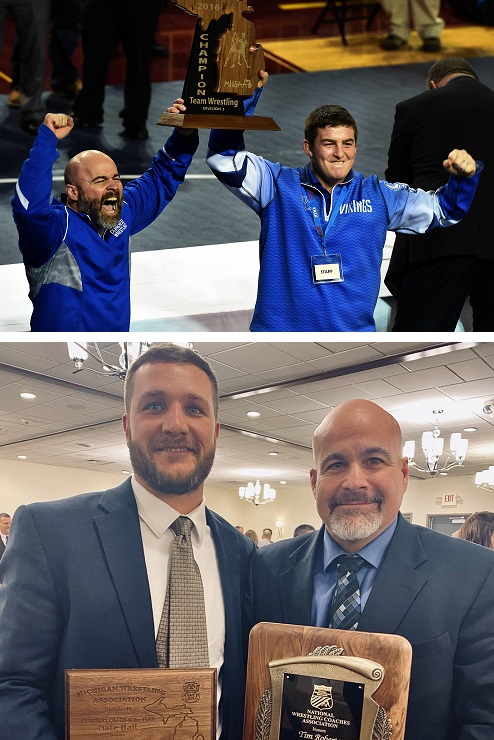 span>“After sitting down with them and having a lengthy discussion, I realized they have an extremely organized and articulated plan as to how they are carrying the torch moving forward,” Crow said. “Whenever I have a question, I either text or e-mail both of them on a group thread. They both chime in and more often than not, the answer is exactly the same for both of them. It's a really good fit, as they are close friends and have no egos.”
span>“After sitting down with them and having a lengthy discussion, I realized they have an extremely organized and articulated plan as to how they are carrying the torch moving forward,” Crow said. “Whenever I have a question, I either text or e-mail both of them on a group thread. They both chime in and more often than not, the answer is exactly the same for both of them. It's a really good fit, as they are close friends and have no egos.”
Stevens is a 2007 Dundee graduate. He wrestled for Roberts. His dad was a Dundee wrestler as well, graduating in the 1970s. Stevens brings his connection to the Dundee wrestling community to the table as well as years of coaching experience.
Hall is from nearby Blissfield, where he was an all-state wrestler. He wrestled for Grand Valley State’s club program and was a coach there as well. He returned to southeast Michigan to coach with his father – Adrian Madison head coach Scott Hall – and joined the Dundee staff when he became a physical education teacher at the middle school about five years ago.
As co-head coach, Nate Hall handles a lot of the organizational duties, especially anything involving the school district, since he works there. Stevens brings a technical side of the sport with him.
The duo believe they can make it work because of the chemistry between them.
“I was always more of a technical wrestler,” Stevens said. “I think Tim (Roberts) felt I could help connect with the kids and teach them how to do a few things differently.
“After I graduated from high school, I got away from wrestling for a while, but in 2011, Tim reached out to me and asked if I wanted to get back involved and it seemed like a no-brainer. I missed it. I liked being around him and there were some things I could bring to the table. I was chomping at the bit once the opportunity opened for me.”
Stevens said Roberts was wonderful to learn from because he was such a great person and sought out input from his staff.
“Tim’s approach to coaching was unique,” Stevens said. “He’s very open-minded and understands there is so much more to learn. You constantly want your kids and program to grow. Every year I coached with him, he changed something every year. He was constantly modifying, tweaking, and seeking out help and advice from others.”
Hall likes how things have started.
“It’s going very well so far,” Hall said. “Tim didn’t leave the well dry. He’s got an established program and an established wrestling community that has been supportive of both Garrett and I so far.
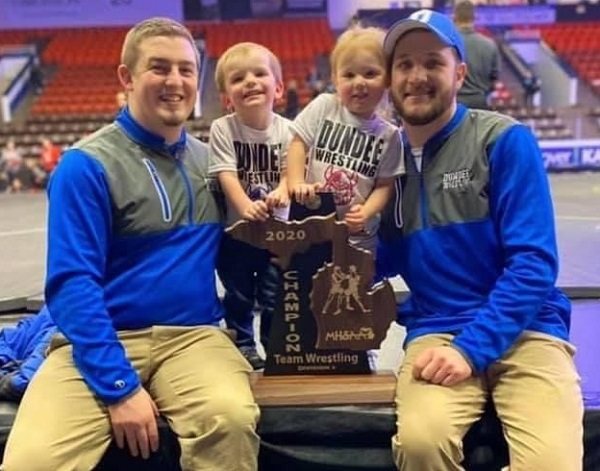 “We’ve got a tremendous senior class – three state champions and another kid that was third in the state last year. Their leadership is really going to be a huge aspect of our success this year.”
“We’ve got a tremendous senior class – three state champions and another kid that was third in the state last year. Their leadership is really going to be a huge aspect of our success this year.”
The Vikings also have 14 freshmen.
“We’ve hit the ground running,” Hall said. “We provide a lot of opportunities in the offseason for kids to get into the wrestling room and stay active. Most of our guys are active throughout. The freshmen are a real promising group that we can keep the ball rolling,” Hall said.
The veterans in the wrestling room include Kaden Chinavare, a Central Michigan University signee who won an Individual Finals title as a sophomore; Aiden Davis, a two-time Finals champ headed to Bucknell; and Braeden Davis, a Penn State University recruit looking for a fourth consecutive Finals title in 2023.
“The biggest thing with this group, I would say, is their willingness to push each other in the right manner,” Hall said. “We’ve got a lot of successful individuals, and they are already going out of their way to make sure each person around them is getting the most out of their reps they can get.
“The team chemistry is already a big part of it.”
Both coaches admit there is pressure to maintain a program that is not just known at the state level, but nationally.
“If you’re not feeling that pressure, maybe you’re not taking it as seriously as it needs to be taken,” Hall said. “We are here to help kids accomplish their goals, and pressure is a part of that – especially at the elite level a lot of our wrestlers want to compete at.”
Despite the turnover in coaching, Dundee’s goals remain high.
Dundee opens with the Grappler Gold, will go to Davison, then compete at a big invitational in Ohio. They Vikings will compete at Detroit Catholic Central and the Hudson Super 16 in late January.
“We always want to aim high,” Stevens said.
 Doug Donnelly has served as a sports and news reporter and city editor over 25 years, writing for the Daily Chief-Union in Upper Sandusky, Ohio from 1992-1995, the Monroe Evening News from 1995-2012 and the Adrian Daily Telegram since 2013. He's also written a book on high school basketball in Monroe County and compiles record books for various schools in southeast Michigan. E-mail him at [email protected] with story ideas for Jackson, Washtenaw, Hillsdale, Lenawee and Monroe counties.
Doug Donnelly has served as a sports and news reporter and city editor over 25 years, writing for the Daily Chief-Union in Upper Sandusky, Ohio from 1992-1995, the Monroe Evening News from 1995-2012 and the Adrian Daily Telegram since 2013. He's also written a book on high school basketball in Monroe County and compiles record books for various schools in southeast Michigan. E-mail him at [email protected] with story ideas for Jackson, Washtenaw, Hillsdale, Lenawee and Monroe counties.
PHOTOS (Top) Nate Hall, left, and Garrett Stevens walk together during the opening march at an MHSAA Team Finals; retired coach Tim Roberts is behind them, waving. (Middle) Stevens, top, and Hall stand with their retired coach and mentor at various events. (Below) Stevens and son Brady, and Hall and daughter Kimberly, celebrate the 2020 championship. (Top and below photos by Kathy Killion.)

